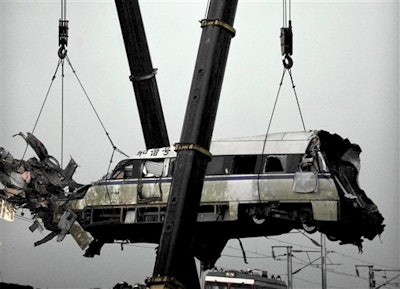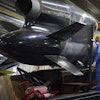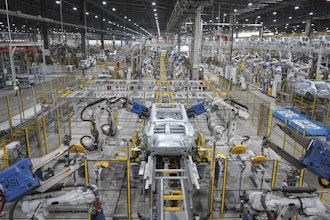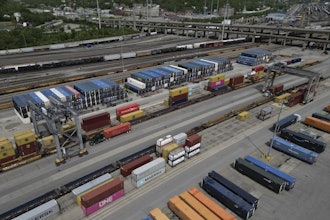
PARIS — France's government will buy 15 new high-speed trains as part of a plan to save a historic but struggling manufacturing site from closure and rescue hundreds of jobs ahead of presidential elections.
The plant belongs to Alstom, a partially state-owned French engineering company that has global reach — it will build high-speed trains in the U.S. and makes trams and subway lines around the world — but struggles at home.
Alstom last month announced that it would close the plant, which made France's first high-speed TGV train. The closure would have led to 400 job cuts and redeployed employees to other sites in the country.
Critics said the problems were symbolic of France's inability to keep manufacturing jobs at home.
On Tuesday, France's junior minister in charge of industry, Christophe Sirugue, visited the site and met Alstom CEO Henri Poupart-Lafarge.
He announced that the government had ordered 15 new high-speed trains from the plant. In addition, the government confirmed previous orders for 30 regular trains and 20 rescue locomotives. The national railway company, SNCF, ordered another 6 high-speed trains for a line connecting France to Italy.
Sirugue also met union activists and local officials in the eastern French town of Belfort, where the plant is located.
In the longer term, the plant is going to diversify its activities to become a maintenance center for Alstom's products in Europe. That will ensure work to 150 employees, Sirugue told a news conference.
Alstom and the government will invest a combined 70 million euros ($79 million) to modernize and adapt the plant, he said. The French state has a 20 percent stake in Alstom.
Poupart-Lafarge praised an "extremely constructive dialogue that helped find new opportunities" for the site.
Socialist Prime minister Manuel Valls tweeted: "Alstom's site in Belfort is saved!" and told lawmakers that the government has mapped out a "strategy" to ensure the company's future.
Former president Nicolas Sarkozy, competing in the main conservative party's primary ahead of next year's presidential election, said it's "good news for the company, yet nothing is solved".
"Anyone can see that this hastily cobbled plan does not meet the challenge of the real rescuing of our rail industry," he said.
Far-left leader Jean-Luc Melenchon said the government's plan "has only one goal: to avoid, cynically, the closure ahead of the presidential election."
In France, where Alstom has had its headquarters since the 19th century, the company suffers from low orders. Last year, it sold its power and transmission division to U.S. industrial conglomerate General Electric for $14.1 billion.
Its domestic struggles contrast with the company's strong global presence.
Alstom is among the world's leading makers of high-speed trains, tramways, metros and traction systems — and most of the engines are built in the geographic regions where the contracts are signed.
The company is present in over 60 countries and employs 31,000 people, according to its website.
Alstom won in August a major contract in the United States, building new Amtrak trains in New York for the Boston-Washington line. It also recently won contracts in Italy, the Netherlands and Germany. It provided a tramway to the Brazilian capital, Rio de Janeiro, ahead of the Olympics.






















